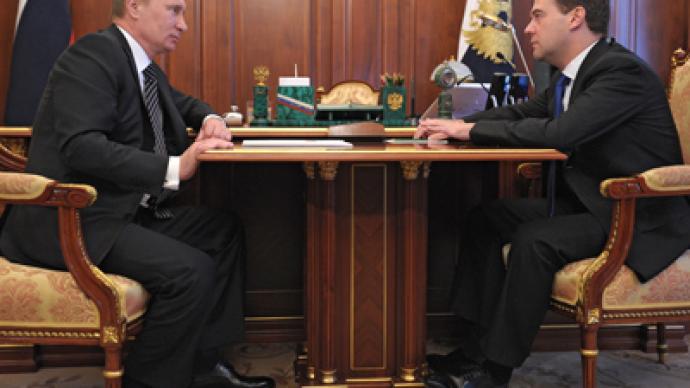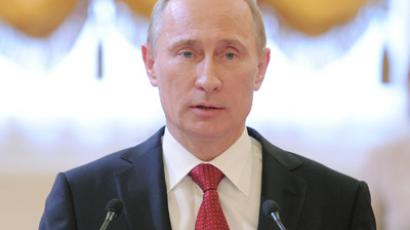Russian government approved, only quarter of ministers stay

Vladimir Putin has signed the orders on Russia’s new cabinet, replacing three quarters of its members in what was promised to be a “powerful impulse from new people”.
The signing came after several days of preparations that even kept the president from taking part in the G8 summit. Dmitry Medvedev, who went to Camp David instead, met with Putin after returning to Moscow."The government will be renewed by approximately three quarters. These are new people, who have appeared just recently or have not been government members before," the PM told the president.Medvedev presented his government suggestions to Putin five days ago. Even though the premier promised major cabinet renewal and “a powerful impulse from new people”, the names on the lists were not disclosed to media. Medvedev explained this by a desire “to maintain some intrigue”. This aim was achieved, and for several days journalists were left guessing about the appointments. They eventually drew a comment from Medvedev’s press secretary Natalya Timakova, who on Friday dismissed the bravest of all suggestions – that the new government could include former Finance Minister Aleksei Kudrin and billionaire-turned-politician Mikhail Prokhorov.As the fresh appointments were announced it turned out that some government veterans retained their posts, first of all Foreign Minister Sergey Lavrov. Finance Minister Anton Siluanov also remains at his post, as does Igor Shuvalov, first deputy prime minister in charge of economic policy. Justice Minister Aleksandr Konovalov also stays put.Longtime Putin’s allies Vladislav Surkov and Dmitriy Kozak also remain in the government as deputy prime ministers, with Surkov also appointed head of the government’s staff.Former presidential aide Arkadiy Dvorkovich, plenipotentiary to the Central Federal District Aleksaner Khloponin and former deputy Moscow mayor Olga Golodets also got appointments as deputy PMs.Andrey Belousov was appointed minister of economic development to replace Elvira Nabiullina who, according to earlier media reports, will become a presidential aide on economic issues.The Ministry of Health and Social Development is split in two and two former deputies to the head of the agency promoted to ministers – Maksim Topilin became the minister of labor and social protection and Veronika Skvortsova became minister of health.Rashid Nurgaliyev lost his position as interior minister, with the head of the Moscow city police, Vladimir Kolokoltsev, appointed in his place. Nurgaliyev was conducting the troubled Russian police reform over the past few years and was subject to a great deal of criticism as reports of police brutalities continued to arrive despite numerous re-attestations in the agency’s ranks.Kolokoltsev, on the other hand, demonstrated an ability to efficiently handle the protests that took place in the capital after last year’s parliamentary elections.Another man charged with uneasy task of reforming his ministry – Anatoliy Serdyukov – retained the defense minister’s post.Former MP Vladimir Medinskiy was appointed minister of culture. Medinskiy is a high-placed member of the United Russia and one of the authors of the popular series of books Myths about Russia, which argued with the widespread foreign and local stereotypes in describing the country’s past and present.The former head of the Russian internal republic of Chuvashiya and an activist of the pro-Putin movement United Public Front, Nikolay Fyodorov, was appointed minister of agriculture. Former communications minister of Tatarstan, Nikolay Nikiforov, becomes the federal communications minister and former presidential representative in the Central Federal District, Oleg Govorun, will become the head of the Ministry of Regional Development.The new government also boasts an entirely new position – minister for ties with Open Government – responsible for the work with this advisory board created on Dmitry Medvedev’s initiative. This place is occupied by Mikhail Abyzov – one of the Open Government’s founders and most active members.During the first session of the new government Prime Minister Medvedev said that the ministers must develop and approve the guidelines for the country’s socio-economic development within six months. He added that the cabinet has every opportunity to fulfill this task and that at least five of the state programs must come into force as of January 1, 2013. “I draw your special attention to the priority of meeting the demographic parameters announced in the addresses of the country’s political leaders,” Medvedev told the ministers.
Read related column here














